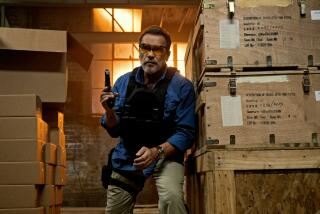The Hero Rides Back Into Town
- Share via
They roped themselves together so they would be found together. That is, they would live or die as a band of brothers, under 240 feet of Pennsylvania limestone.
So how did those nine trapped coal miners survive in the cold water, in the darkness, for 77 hours?
“At any certain time, maybe one guy got down, and then the rest pulled together,” recalled one of the rescued miners Sunday. “And then that guy would get back up. It was a team effort.”
When the drillers broke through, one of the miners shouted: “There’s nine men ready to get the hell out of here. We need some chew.”
Chewing tobacco?
That’s men for you, fraternal enough to save lives, macho enough to be jaunty in the face of death, manly enough to be politically incorrect.
Male virtues and values have never really changed, but after decades of disdain, Americans are seeing the natural ways of men in a new and more positive light.
Consider the fate of manual labor and danger. The kind of mostly testosteronal toil that digs up coal or merely wears out one’s back has been on the downswing for a long time.
Of the 134.1 million Americans with jobs in June 2002, barely more than a quarter of them could be called blue-collar. Employment in the coal industry has plummeted; just 37,663 coal miners made their living working underground in 2000, down 90% from half a century ago.
As the economy shifted from industrial to informational, much of the culture shifted too.
The media celebrated new kinds of heroes, Wall Streeters, dot-commers, TV-talkers.
And yet many of those with the softest hands never lost their atavistic yearning to recapture the sweaty, risky ways of the past. That’s why books such as “Young Men & Fire,” by Norman Maclean, and “The Perfect Storm,” by Sebastian Junger, became bestsellers.
Indeed, postindustrial men--and yes, a fair number of women--have gotten into the act themselves, forsaking their keyboard careers for a wild ride on the far side. But then came the real thing.
On Sept. 11, Americans were reminded of the value of valor.
Why would firefighters, overwhelmingly male, go running up the stairs of the World Trade Center when everybody else was running down?
Bruce Springsteen, on the cover of this week’s Time magazine, is releasing an album centered on the events in the Twin Towers: “The disorientation on that staircase, the load on your back, the heaviness of the equipment, the sense of duty, of responsibility.” He wondered about those heroes, and then he wrote songs celebrating them.
Thus the paradox of our present moment. On the one hand, economic trends diminish blue-collar work. And yet on the other hand, even as the blues fade away, the culture lionizes them and their qualities.
Indeed, the news media depend on them for ratings-drawing drama.
Where would local and cable news be without cops chasing crooks and emergency workers rescuing miners?
But for all the coverage, most Americans--including this American, who sits in an office risking little more than a paper cut--are left to wonder about the deep wellsprings of courage and determination that bubble up in men.
One window into that world is the new movie “K-19: The Widowmaker,” the mostly true story of a Soviet submarine that nearly sank in Arctic waters in 1961, saved only by the self-sacrifice of seven crewmen.
What made those sailors so brave?
At the end of the film, Harrison Ford, who plays the boat’s skipper, offers a toast and an explanation. “When the time came, it was their duty, not to a method, or to the state, but to us, their comrades.”
So maybe it’s that most ancient of attributes, male bonding, that even today makes men into brothers, and then into heroes. It’s tragic, perhaps, that we need such men, but it’s a good thing that we have them.
*
James P. Pinkerton writes a column for Newsday in New York. E-mail: pinkerto@ix.netcom.com.
More to Read
Sign up for Essential California
The most important California stories and recommendations in your inbox every morning.
You may occasionally receive promotional content from the Los Angeles Times.













